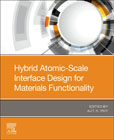
Materials in future are expected to perform with increasing efficiency in complex and dynamic environments and efficient materials are often to exhibit simultaneous multi-functionality (structural, electrical, thermal, optical, ..), even in very dynamic environment. Hybrid materials design, in contrary to monolithic concept, is a cost-effective and accelerated approach for future materials design and development. Taking materials hybridization at smaller scale, as such at atomic scale, offers exceedingly high-payoff opportunities for optimizing materials functionality at reduced material consumption that is expected to lead to reduced qualification costs (eliminates many costly component and system level qualification tests). Taking the materials design in smaller scale through employing multifaceted approach along with experimental correlation would enhance confidence in the design. This approach would also provide foundations for future efficient and optimal materials design. Available monographs (books) on the street dealing with multifunctional materials design typically focus on a specific property tailoring (say, electrical, thermal, or other), but, do not provide a comprehensive methodology on designing materials contracts of simultaneous multifunctionality. In this monograph, a broad range of atomistic, meso, and macro scale computational methodologies will be covered towards atomistic and nanoscale materials design incorporating multiphase (hybrid) materials constructs for tailoring structural, thermal, and electrical properties. Incorporation of multiphase (hybrid) in the atomistic scale broadens up design domain for property tailoring much more than monolithic materials design, where the materials interface design constituting the materials hybridization is crucial. The benefit of taking the materials interface design to the atomistic scale for simultaneous multifunctionality will be illustrated in this manuscript. Along with modelling approaches, associated materials processing and materials testing will also be covered in relevant chapters. The book will be organized to systematically present the computational methodologies for materials hybridization and its interface design at the atomic scale. Materials hybridization, especially at the atomic scale, yields significant materials savings on materializing targeted performance. In this regard, materials interface design (atomic configuration) is the key to optimize and achieve such performance metrics, which will be covered in details in this bookThis book would help in material selectivity and materials design phase of any product designProblems related to micro devices in thermal, electrical, and structural applications INDICE: 1. Introduction to hybrid materials design issues and challenges for micro devices 2. Molecular Dynamics (MD) methodologies for predicting thermal transport in aerospace (cross-linked) polymers 3. Electron transport through nanomaterials interfaces 4. Wave Packets MD 5. Molecular Mechanics (MM) for materials interface strength 6. Kapitza resistance in lattice structures 7. Porous hybrid nano materials: processing, characterization and materials properties 8. Nano porous graphitic carbon for super capacitors 9. Nano porous carbon for hydrogen storage 10. Laser induced nano materials processing 11. Nano materials interface strength measurements 12. Combined thermal-mechanical micro measurement
- ISBN: 978-0-12-819117-0
- Editorial: Elsevier
- Encuadernacion: Rústica
- Páginas: 350
- Fecha Publicación: 01/11/2020
- Nº Volúmenes: 1
- Idioma: Inglés
